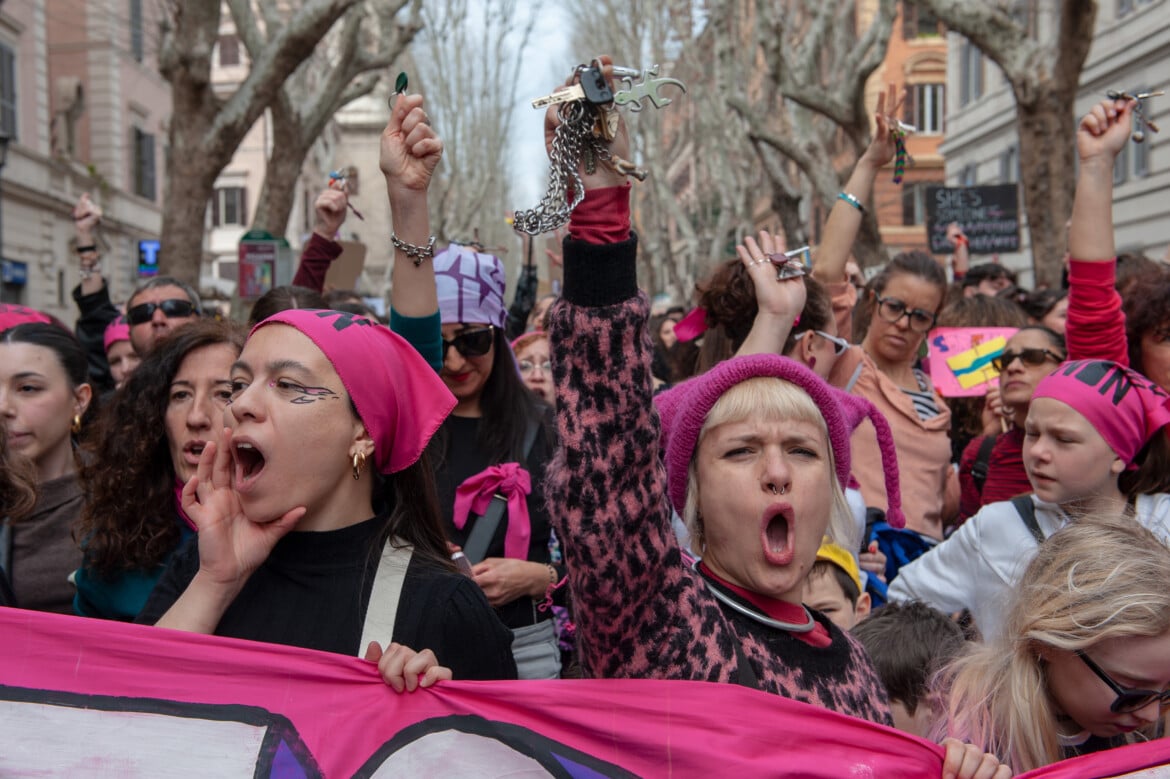Reportage
A feminist and pacifist wave marches in Rome
This is the first demonstration in months that takes a clear position for peace and against military escalation, with the exception of the Perugia-Assisi Peace March. “We are outraged by the complicity of our government, the EU and the U.S., and by the €800 billion earmarked for ReArm Europe that will be taken away from health, schools, social services.”

When the March 8 transfeminist demonstration, headed by a banner with the words “Lotto, boicotto, sciopero” (“I fight, I boycott, I strike”), crosses Via Labicana, as it does every year, it makes for a remarkable sight, striking against the background of the Colosseum. There are more than 20,000 people marching among peace flags, those of Palestine and Kurdistan, and the fuchsia ones of Non Una di Meno, which organized the day of struggle throughout Italy.
Slogans can be heard against the president of the United States (“More trans, less Trump” was one of the most recurring ones), against Argentinian president Javier Milei and against the president of the European Commission, Ursula Von der Leyen. And this is no accident: the platform of the March 8 protest called for a strike against the ongoing wars and demanded disarmament.
War is a patriarchal issue. Authoritarian and nationalist governments make war for their own profit, but workers, men and women, pay for it. – NUDM activists
From the truck that opens the procession (which, like on Nov. 25, displays a phrase coined by Gisele Pelicot: “Shame must change sides”), Palestinian and Italian activists speak out against the genocide in Gaza. “War costs money: authoritarian and nationalist governments make war for their own profit, but workers and women workers pay for it,” the transfeminist protesters shout across the square.
This is the first demonstration in months that takes a clear position for peace and against military escalation, with the exception of the Perugia-Assisi Peace March. More than 250 women and feminists have circulated an appeal in recent days to boycott the March 15 “March for Europe” and take part in the one on March 8 instead. “We are tired of war, of neo-colonial wars in Africa, of the one between Russia and Ukraine, of Israel's genocidal violence on the Palestinian people,” the text reads. “We are outraged by the complicity of our government, the EU and the U.S., and by the €800 billion earmarked for ReArm Europe that will be taken away from health, schools, social services.”
From the truck, the speakers accuse the “cultural recession of the right-wingers who punish and repress,” and lead the charge against the Security Bill and the Caivano Decree being imposed on peripheral neighborhoods such as Rome's Quarticciolo: “One cannot solve the problems with police. The activities of neighborhood movements must be protected,” the protesters say.
Every now and then, the truck falls silent for a “minute of noise” protest in which everyone jangles their keys, an alternative to the minute of silence imposed in schools by the Minister of Education (“and Merit”) Giuseppe Valditara after the femicide of Giulia Cecchettin. “These keys are not a symbol of our fear, but represent our desire to cross the street safely. Today we are going on strike from the role of the perfect victim.” This, together with the unique role of mother, is one of the two straitjackets in which right-wingers would like to confine feminisms. Instead, the transfeminists reject the Meloni’s government recognition of femicide as a crime, approved on March 7. “That is just a retribution- and prison-focused measure that doesn’t solve the root of the problem,” says a NUDM militant. ”We are not asking for more jail time and more repression, but to fight the patriarchal logic: throwing a person in jail for life is just a stopgap, but that will not give us back our murdered comrades and sisters.”
To Meloni's criminalization approach “we answer that real safety is education on sexuality, emotions and consent as a subject in school; it is social services, anti-violence centers with adequate structural funding, the right to health and self-determination, free, safe and unhindered abortion, support for gender affirmation pathways.”
Non Una Di Meno also points out that the Meloni government’s measure was “dropped from above without a dialogue with the anti-violence centers: the government acts by creating more crimes, but forgets that increased penalties are not deterrence.” They denounce the lack of “serious institutional work to ensure that the mechanisms that reproduce violence are torn down.”
“Femicide is just the tip of the iceberg: efforts must be made to eliminate discrimination, which affects women from school to the workplace, and fight precariousness. On that, Meloni is taking steps backward.”
At 2 p.m. the demonstration reaches Circus Maximus, and the women and men dance. “Let the government have repression. We represent participation, struggle, consent, education. We are a rising tide and you won't be able to stop us,” is the message that marks the end of the protest.
The March 8 strike “has a very important meaning: that of coming together, of experiencing sisterhood, of feeling strong together, protesting for our denied rights and defending our needs,” explains a militant as she leaves the march at the end. “But this is just one of many protests that we do in neighborhoods, schools, counseling centers, hospitals, wherever there is a need to destroy the logic of possession, of jealousy, of ownership, of different treatment between men and women.”
Originally published at https://ilmanifesto.it/marea-femminista-e-pacifista on 2025-03-09
